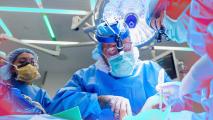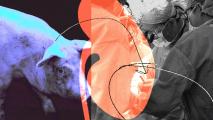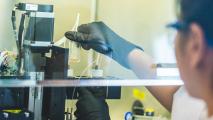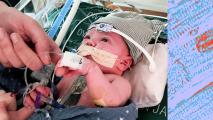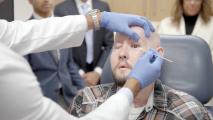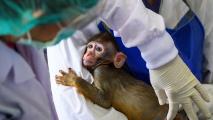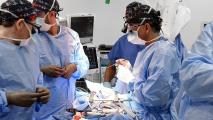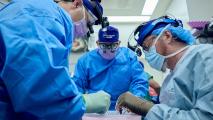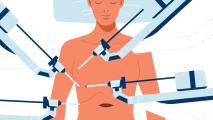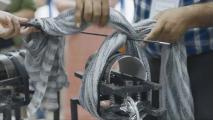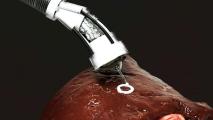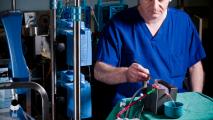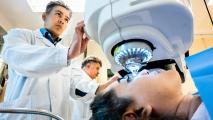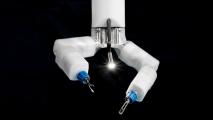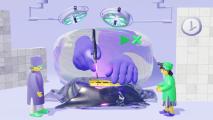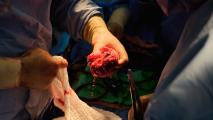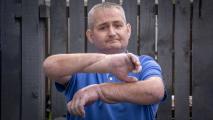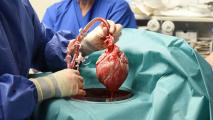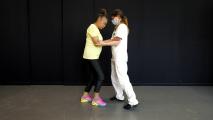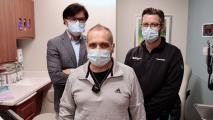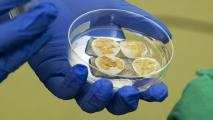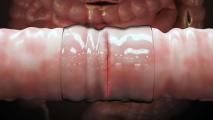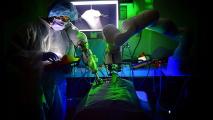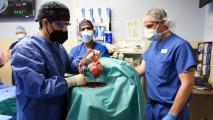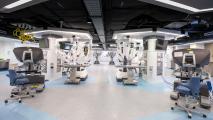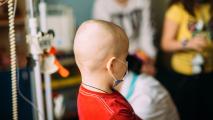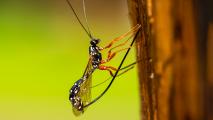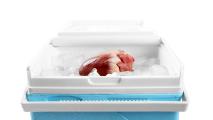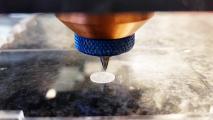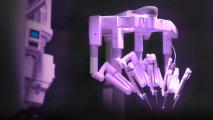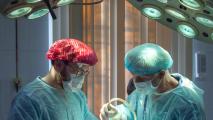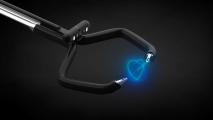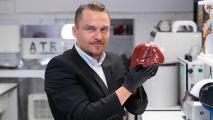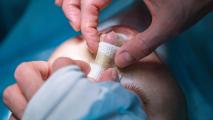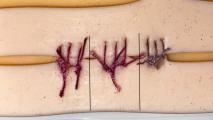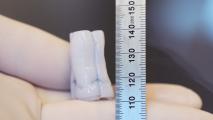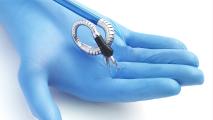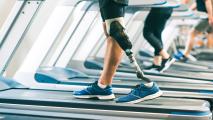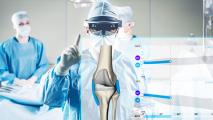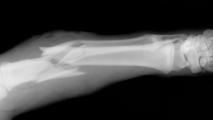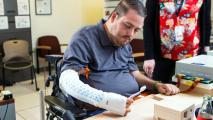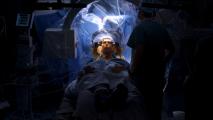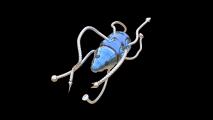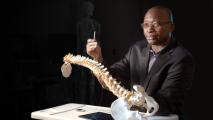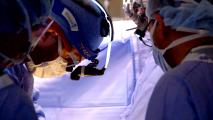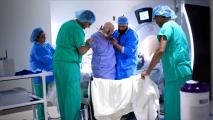Field: Surgery
How cryopreservation could end death as we know it
The technology could one day allow people with terminal illnesses to go into "hibernation" until a cure is found.
First-of-its-kind pig kidney transplant is a success
A woman with heart and kidney failure is now the second person in the world to undergo a gene-edited pig kidney transplant.
First person to get a gene-edited pig kidney is “recovering well” so far
A gene-edited pig kidney has been successfully transplanted into a person for the first time, giving new hope to people with kidney failure.
3D-printed skin could heal wounds with less scarring
Penn State scientists have 3D-printed skin directly on top of open wounds — an achievement that could improve reconstructive surgery.
Toddler thriving after world’s first partial heart transplant
A toddler born with faulty heart valves is thriving nearly two years after undergoing the world’s first partial heart transplant.
Arkansas man receives world’s first eye transplant
The world’s first whole eye transplant puts doctors a major step closer to restoring vision with donor eyes in the future.
Monkey lives with CRISPR’d pig kidney for over two years
A monkey that survived for 758 days with a kidney from a gene-edited pig is a major step forward for xenotransplantation research.
Gene-edited pig heart gives a dying man a second chance at life (Updated)
For the second time ever, a gene-edited pig heart has been transplanted into a person with terminal heart disease.
A pig kidney is still working in a person after 32 days
A gene-edited pig kidney has been functioning in a person for a record-breaking 32 days and still shows no signs of failure.
Man receives donor lung through tiny 3-inch incision
The first fully robotic lung transplant was completed in Spain by surgeons using a robot and a brand-new access point.
How low-cost surgical training programs could save lives in low-resource countries
In partnership with Intuitive
Lack of access to surgery leads to millions of deaths every year around the world. Meet the innovators who are working to reduce this toll.
New 3D bioprinter could repair organs inside the human body
A snake-like soft robot designed to 3D bioprint tissues inside patients’ bodies might one day replace invasive implantation surgeries.
First-of-its-kind surgery may have helped reverse baby’s paralysis
The first recipient of a groundbreaking spina bifida treatment is now one year old and showing no signs of leg paralysis.
Scientists convert kidney to universal “O” blood type
Kidneys still need to be tissue matched, but by converting them to type O, more will be available for transplant.
Synthetic cartilage is now stronger than the real stuff
Using a heating process, Duke researchers have created a synthetic cartilage hydrogel that can outperform the real thing.
Eye implant made from pig skin reverses blindness in 14 people
Using collagen from pig skin, Swedish researchers created an artificial cornea that reversed blindness in 14 people.
NASA is sending a robot surgeon to the ISS (Updated)
A MIRA surgical robot is heading to the ISS in 2024 so developers can test its potential to help astronauts survive medical emergencies.
Why don't surgeons train like fighter pilots? Now some do.
Using AI and analysis, Theator is helping surgeons improve how pilots and pro athletes do: by going to the tape.
NYU performs two more pig-to-human heart transplants
Two pig-to-human heart transplants performed by surgeons at NYU Langone Health showed all the signs of success.
FDA may soon allow pig organ transplant trials
With pig transplantation looking increasingly viable, the FDA may soon allow clinical trials of the technique to begin.
How three kids got kidney transplants without immunosuppressants
Stanford researchers have developed a new technique that allowed three children to receive kidney transplants without immunosuppressants.
UK man receives double hand transplant to treat rare disease
UK surgeons have performed the world’s first double hand transplant to treat scleroderma, a rare autoimmune disease.
Docs discover likely cause of pig heart transplant failure
A pig virus — and not organ rejection — appears to be the reason a man who lived for two months after a pig heart transplant ultimately died.
Bacteria living inside tumors help cancer spread through the blood
Intracellular bacteria promote cancer metastasis by enhancing the tumor cells' resistance to mechanical stress in the bloodstream.
Bedridden woman stands again thanks to spinal implant
A spinal cord stimulator is helping a woman who was bedridden for 18 months because she fainted every time she stood up regain her mobility.
Rare double lung transplant saves cancer patient’s life
A Chicago lung cancer patient’s successful double lung transplant is a ray of hope for others with the deadly disease.
Baby thrives after first-of-its-kind heart transplant
A baby’s first-of-its-kind heart transplant could help future patients avoid organ rejection and reduce the need for immunosuppressant drugs.
MIT engineers invent surgical “duct tape”
MIT’s biodegradable surgical tape is designed to seal tears in the gastrointestinal tract, potentially preventing sepsis-causing leaks.
Magnetic “seed” heats and kills tumors in new cancer therapy
A novel cancer therapy uses a magnetic “seed” to precisely target and kill brain tumor cells without the need for open brain surgery.
Surgery robot outperforms humans at “keyhole surgery”
Johns Hopkins' autonomous surgery robot, STAR, performed a tricky keyhole surgery on live pigs better than a human surgeon could.
Pig kidneys transplanted into body of brain-dead man
A brain-dead man was the recipient of two pig kidneys — a groundbreaking transplant that could help bring the organ shortage to an end.
Surgeons transplant pig heart into Maryland man
A pig heart is now beating in the chest of a man in Maryland, marking a huge step forward for xenotransplantation research.
This robotics lab wants to develop the dream surgery
Chicago’s Surgical Innovation Training Lab is developing the robots, surgeons, and digital surgeries of the future.
VR shows parents what will happen in their baby’s surgery
A U.K. hospital is using VR to help parents see the potential impact skull-reshaping surgery could have on their baby’s appearance.
Can testicular tissue restore childhood cancer survivors’ fertility?
A procedure that used frozen testicular tissue to restore fertility in animals could soon do the same for childhood cancer survivors.
Tissue implant extends lives of children born with athymia
A treatment that could dramatically extend the lives of children born with the rare condition athymia has been approved by the FDA.
Wasps inspire a new surgical needle
The next new surgical tool may come from an odd place: parasitic wasps whose eggs eat their hosts inside-out.
New organ coating could help prevent transplant rejection
A coating for donor organs that minimized the chance of transplant rejection in mice might one day eliminate the need for immunosuppressants.
This 3D-printed graft may improve ruptured eardrum surgery
Researchers at Harvard have developed a 3D-printed graft they hope will make ruptured eardrum surgeries safer, faster, and more effective.
Inside the world of a robotic surgeon
In partnership with Intuitive
Many of the world’s top surgeons are learning first-hand what they can do with surgical robots — and it’s unlocking a new era in health care.
Kidney donation vouchers shave years off wait times
Kidney donation vouchers appear to be working as hoped, increasing the number of donations and decreasing wait times for needed organs.
The augmented, virtual, human-machine future of surgery is here
Advancements in XR technologies are rapidly integrating into the future of surgery.
Surgeons can now practice on a 3D-printed copy of your liver
A new technique for creating life-like 3D-printed livers based on individual patients’ scans could help surgeons be better prepared for operations.
3D-printed nose cartilage may someday fix your face
Researchers have developed a way to bioprint nose cartilage that they hope will one day minimize the need for invasive harvesting from the ribs.
These color-changing sutures can catch infections
Iowa high school senior Dasia Taylor has invented color-changing sutures that can catch an infection early.
Scientists have created a heart valve implant that grows
Children may have heart valve replacement surgery 5 or more times. A lab-grown, growing valve may change that in the future.
Surgery robot could make hysterectomies less painful
The FDA has approved its first surgery robot for use during a vaginal hysterectomy, which is less invasive than the abdominal approach.
New amputation surgery technique may lead to better control of prosthetics
A new amputation surgery technique developed at MIT reconnects muscle pairings and may lead to better prosthetic control — and less pain.
Man's double hand & face transplant may be first to succeed
Five months post-surgery, a double hand and face transplant recipient shows no signs of transplant rejection, suggesting the procedure was a success.
First AR-assisted knee replacement in America is a success
The United States’ first AR-assisted knee replacement surgery was a success, marking another milestone for the use of AR in healthcare.
Doctors use AR surgery to implant 3D-printed eye socket
Doctors in Israel used a combination of AR surgery and 3D printing to repair a patient’s damaged eye socket quickly and efficiently.
Jaw joints grown from fat could alleviate TMJ pain
Researchers have grown new jaw joints for pigs from fat-sourced stem cells, and the technique could one day cure TMJ pain, or even knee pain, in people.
A new way to heal badly broken bones with electrical stimulation
A new bone scaffold delivers electrical stimulation to broken bones, speeds up the healing process, and then simply dissolves into the body.
Robotic surgery unlocks a new era of medicine
In partnership with Intuitive
The advancement of robotic surgery systems is expanding physical limitations to allow for minimally invasive procedures and improved patient recovery.
Using Ebola to fight brain cancer
A lab-altered Ebola virus can hunt human brain cancer cells without killing healthy cells.
Brain implant restores sense of touch in man with paralysis
Researchers have used a brain implant to help a man with paralysis both move his arm again and regain a sense of touch.
This adjustable heart valve would grow as a child ages
A new, prototype artificial heart valve can adjust to a child’s growing body, potentially sparing them from multiple open-heart surgeries before adulthood.
Deep brain stimulation for Parkinson’s, Tourette’s
Deep brain stimulation surgeries have the power to relieve the symptoms of Parkinson’s, Tourette’s, and other involuntary movement disorders.
Series|
Future of Fertility
Uterus transplants: A step closer to overcoming infertility
About 1 in 500 women have a condition that prevents pregnancy called absolute uterine factor infertility, but recent developments show promise that a uterus transplant surgery could be the solution.
Diving deep into the brain to measure neurotransmitters
Researchers are taking the first measurements of neurotransmitters in active human brains, using computational psychiatry to understand how the mind works.
What's special about cancer-killing nanobots? precision.
These tiny, robotic machines can deliver drugs directly to infected cells, and they're changing the future of medicine.
Robotic birth simulator saves lives in the delivery room
Meet the group of medical professionals that’s delivering babies from robots to prepare for real-life emergencies in the hospital room.
Hope grows for patients with spinal cord injuries
Severe spinal cord injuries resulting in total paralysis are usually considered permanent, with no hope of recovery. And yet, in a handful of patients spanning multiple levels of severity, movement is being regained.
Series|
Superhuman
Spinal implants: Helping the paralyzed walk again
Walking after complete spinal cord injury used to be a far-fetched dream. But, with advances in spinal cord implants for paralysis, even paraplegics have been able to regain mobility and walk again.
Making tumors glow to improve cancer surgery
This surgeon is improving surgery by lighting up cancer cells.
Series|
Superhuman
These doctors are performing brain surgery … using sound
Bonnie D'Ettorre suffers from a nerve disorder causing uncontrollable shaking. Doctors at Ohio State are about to "burn it out" using a thousand beams of ultrasound.

